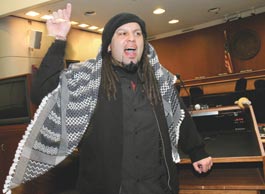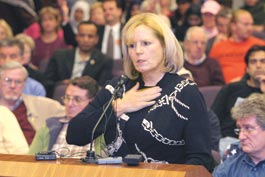home | metro silicon valley index | news | silicon valley | news article

Photograph by Felipe Buitrago
Tough Crowd: Last month's Human Relations Committee meeting was sometimes a trying one for Sheriff Laurie Smith, who defended her department against allegations from De Anza College protesters.
Distant Relations
Critics say Santa Clara County doesn't give its Human Relations Commission the power to investigate the serious issues that are brought before it
By Najeeb Hasan
BY THE END of last month's meeting of the county's Human Relations Commission, the scene had deteriorated into utter chaos. Anthony Choice, a student activist from De Anza College, brought the public comment to a grinding halt by flat-out refusing to relinquish the microphone. Commission chairman Johnny Khamis traded verbal shots with him until both were visibly infuriated; finally, a red-faced Khamis began yelling, "Out! Out Out! Your time is up!" as Choice's supporters chanted, "Let him speak! Let him speak!"
The unusually large turnout for an HRC meeting had come to see County Sheriff Laurie Smith address allegations of profiling by her department, which has come under fire after a demonstration last November outside Colin Powell's speech at De Anza College's Flint Center. Six of the seven individuals arrested by deputies at the protest were Muslims and the seventh was an African American.
But Choice took issue with the fact that Smith and her public information officer, Serg Palanov, were given 50 minutes to address the commission, while supporters of the arrested protesters had only three to five minutes each to respond. (Commissioners contend that the protesters and their supporters, who had already testified before the commission twice before, had ample opportunity to make their case.) As Khamis declared the out-of-control meeting adjourned to absolutely no acknowledgement from the crowd, Choice chided the commission: "The public wanted to hear it, but you didn't want to listen."
What was lost, however, in the mess of yells, chants, arguments and general confusion, was the role of the Human Relations Commission itself—and its ability to arbitrate an issue that has divided community members and the Sheriff's Department. The disintegration of January's hearing only underlined the contention of some critics that the commission, despite its charter from the county to investigate grievances like the ones surrounding the De Anza incident, isn't equipped to discover in any substantive fashion whether discrimination has taken place or not. They say the commission is only a body that allows the community to sling accusations, not a body that can do anything about real problems.
Power to the People?
If the Santa Clara County ordinance that established the Human Relations Commission is used as a guide, the idea of a full-fledged, serious investigation by the commission isn't out of the realm of possibility. The ordinance clearly gives the commission power to "investigate" and "make findings" on complaints relating to discrimination. It also gives the commission something close to subpoena power, though the HRC has yet to request a subpoena from the Board of Supervisors in the more than three decades of its existence.
But in a practical sense, the commission's power appears to be largely smoke and mirrors.
"When we say 'investigate,' we mean we can receive written testimony," explains Alberto Carrillo, the community programs coordinator of the Office of Human Relations. "We can request written testimony from various agencies. That is, gathering [voluntarily-given] data is the investigation. We're not seeking to get to the bottom of [a matter]. We don't have the time or the expertise to do that. We request information [because] we have a good working relationship with every [governmental] department. When we get testimony, we don't go and dig deeper. If the sheriff gives us information, that's it. We don't go any further than that."
The commission's inability to dig deeper has frustrated community members who feel the commission simply isn't being allowed to do its job.
"They have no powers of remedy," Wood continues. "In that sense they are useless."
At the January hearing, commissioner Maha ElGenaidi drew a sharp response from the activist Choice and hoots from the audience when she concluded, after the sheriff's presentation, that there had been no previous problems with the Sheriff's Department that she could think of, a reflection of the feeling critics have expressed that the HRC is in too tight with the county's most powerful offices.
"They don't want to ruffle feathers," says Wood. "And they don't unless it's absolutely necessary. They pussyfoot a lot before ruffling feathers, and, from an activist point of view, that's always frustrating. But you know what? That's how they operate."
What the HRC does best, many say, is win more abstract moral victories on broader issues from immigration to the juvenile justice system to establishing a county precedent for open grand juries for police shootings.
"They speak with a certain moral authority," says a longtime community activist who has worked closely with the commission in the past. "They are good brokers. They could broker community groups, groups that felt disenfranchised, and in that capacity act as mediators. It's a moral authority they have, not a political authority. They don't always find the truth. They may not be able to solve [specific] problems, and in the majority of cases they probably don't, but they allow the community to vent, which may not seem important, but you need a place to do it."

Photograph by Felipe Buitrago
Choice Moment: De Anza student activist Anthony Choice brought last month's meeting of the Human Relations Commission to a standstill.
Accused of Irrelevance
Some say its limitations make the HRC the wrong place to take an issue like the De Anza protest.
"I don't know why they turned it over to the Human Relations Commission," says Rick Callender, president of the local NAACP. "They are not going to go after the cops, who are totally out of control. The sheriff is going to go in front of this commission, and say, 'We went out there, and it was a mess, a riot situation; the officers felt threatened for their lives.' Put yourself in the commissioners' seats—it's tough to go up against the police. This commission, they're not used to it. What commissioner is going to be able to do that?"
But Dan Mayfield, a local defense attorney who is representing several of the De Anza protesters, would like to see the Human Relations Commission make a finding of profiling at De Anza.
He scoffs at critics who second-guess the decision to take the De Anza 8 (as the arrested protesters have become known in activist circles) case to the Human Relations Commission, as opposed to civil rights groups such as the ACLU or the NAACP. "I hope to get the HRC to adopt a resolution that says 'We believe what occurred at De Anza is an example of racial profiling, and we believe the way to solve the problem is a dialogue between the Sheriff's Department and us,'" he says. "You solve this by putting people with a trained mediator and say, Let's work this out, so it doesn't happen again."
Mayfield says the most important thing the HRC has may be its influence with the Board of Supervisors.
"[The NAACP and the ACLU] are relevant organizations, but they have no say with the county," says Mayfield. "The Human Relations Commission has a lot of umph. They forced the sheriff to give a presentation. The sheriff's an elected official; she got as many votes [as anybody]. She didn't have to come to the meeting. The fact that she spent public money to create this video presentation shows that she's been embarrassed into making an appearance."
Sheriff's Response
Smith's office had prepared a video presentation for the commission—compiled from the department's own footage and footage given to them by news crews at the scene—which Palanov narrated at the January hearing.
Smith also addressed the charges of racial profiling at the HRC meeting. She spoke of her own respect for civil rights, and defended her department's action, calling previous testimony by the protesters and witnesses "grossly mischaracterized" and "blatantly false."
She said rocks and ice were thrown at her deputies during the protest. Warning that "not all protests are peaceful," she used the Seattle WTO protests in 1999 as an example of what she called a "disruptive" protest.
"What happened there was that law enforcement failed, and the result was chaos," she said. "Seattle took extraordinary steps to protect the protesters, but failed to protect the city."
But missing from the commission's hearing last month were the nuts and bolts of a real investigation: the dozens of individual deputies who were at protest were not questioned; the scene of the protest was not reconstructed (one oblivious commissioner asked what the protest had been about, a question made more puzzling by the fact that it was the commission's third hearing on the matter in three months); and there were no requests by the commission for documents pertaining to the protests or policies on profiling. San Jose's branch of the ACLU, meanwhile, has already filed a public records request for such documents, including planning documents regarding Powell's visit to the campus and audio, video footage and photographs of the protest.
"The commission doesn't have a budget," complains Choice, the De Anza activist who was the object of the commission's outrage during the January meeting. "If it did, it would have an investigative apparatus of its own or hire an outside investigator."
Indeed, Hobbs, the director of the county's Office of Human Relations, concedes there is no way his office could provide the commission the necessary staffing even if all the hours of the sheriff's raw video footage was available for review. "A request of that magnitude to review hours of tapes is not something [we can provide]," says Hobbs. "We don't have the capacity or the staff to do the level of detail work that could be done."
Where They Do It Right
Not all citizen complaint commissions are bereft of resources in California. In San Diego County, the Citizens' Law Enforcement Review Board (CLERB), which, like the Human Relations Commission here, is also composed of unpaid Board of Supervisors appointees, has not only more resources, but also, better-defined powers. The document clearly states that an investigation by CLERB includes interviews with not only each party in a dispute, but also individual officers—not just a law enforcement representative—witnesses and any other individual likely to have information concerning the complaint. It also allows for an examination of the scene of the incident and of any physical evidence concerning the incident that is the subject of the complaint. Like the Human Relations Commission, CLERB has subpoena power, but unlike the commission, that power is more accessible, dependent on CLERB's own review board, not on the Board of Supervisors. Further, the CLERB employs two full-time investigators who are trained to conduct investigations at the behest of the citizen board.
Without a similar capacity to make a detailed evaluation of a complaint, can the Santa Clara County HRC fulfill Mayfield's wish of making a finding of profiling?
"We don't make rulings as to whether or not there was racial profiling," Khamis, the commission's chair, says. " What we are charged to do is to try and investigate the claims of the community and try to be an avenue where the community has a voice to the elected officials and government. I think we have enough power, but it's not about power, it's about cooperation. As chairman, I feel we've had excellent cooperation from the sheriff and all avenues of the government."
For Choice, that's part of the problem. "Are those solutions?" he asks. "They don't provide solutions; they just provide additional forums."
Send a letter to the editor about this story.
|
|
|
|
|
|